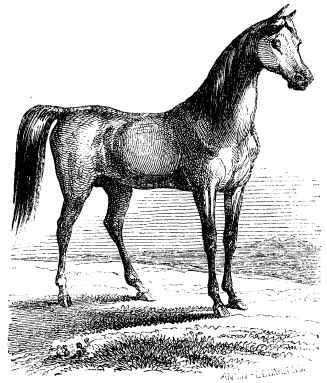SOMETHING
ABOUT THE HORSE.
753

high-priest and consul. Verus,
another Roman Emperor, erected a statue of gold to his horse, and fed him
with raisins and almonds from his own hand. When the creature died, he was
buried with great pomp, all the dignitaries of the empire attending; after
which, a magnificent monument was erected to his memory on the Vatican
Hill.
It was this high appreciation of
the horse which inspired the poet of the land of Uz, that made Solomon
liken his mistress for beauty “ to a company of horses in Pharaoh's
chariots.”
It is by viewing the horse only
in the light of a war-steed, or as an appendage of royalty, that we can
explain many passages, not only in the Old Testament but in the Greek and
Latin classics. Even during the Trojan war these animals were
exclusively in the retinue of princes, and were always associated with the
glorious forthcoming of kings. It is in times comparatively modern
that the horse has become a beast of burden; in the East, more
particularly in Arabia, he is still preserved from labor, save to carry
his master on his errands of pleasure, or with him engage in the strife of
war.
Homer represents that the horses
of Achilles wept for Patroclus, and makes those of Rhesus speak of their
good fortune. Aristotle mentions a horse of Sythia that precipitated
himself from the top of a high rock in order to punish himself for
committing a base act.
The Arab poet, Eldemire, relates
that the Calif Merouan had a horse that never permitted his groom to enter
his apartments without being called. The hapless fellow chancing one day
to forget this observance, the animal became indignant, and seized the
groom in his teeth and ground him against the marble of his
manger.
Pausanius relates that he knew a
horse that showed himself completely conscious of his triumphs, and
that whenever he won a prize in the race at the Olympic games, proudly
directed his steps toward the tribunal of the judges to claim his
crown.
Pride, which is eminently
becoming in the horse, sometimes in him degenerates into disdain.
Bucephalus, according to Plutarch, when once caparisoned, would let no one
approach him but Alexander.
Among the patriarchs of the
nomadic tribes the horse is still the intellectual companion of the chief,
occupying so large a share of his affections that his wife and
children hold a second place. The Arab repeats the immemorial
proverb, that “ He who forgets the beauty of horses for the beauty of
woman will never prosper,” and exulting in the favor of Ali, exclaims,
“Long tresses and long manes will be seen among us until the day of the
resurrection!“ The warrior caste still maintains its supremacy, and we
hear the lamentations of Abd-el-Kader, that many of the horses of the Arab
race have fallen from their nobility because employed in tillage, in
carrying burdens, and doing useful rather than ornamental work. He
declares that if the true horse even treads upon the plowed land he
diminishes in value, and illustrates the idea by the following
story:
“ A man was riding upon a horse
of pure blood when he was met by his enemy, also splendidly mounted. One
pursued the other, and he who gave chase was distanced by him who fled.
Despairing of reaching him, the pursuer in anger shouted
out,

THE ARABIAN.
Whatever may be said to the
contrary, there is but one true horse in the world, and that is the Arab
stallion. His beautiful, nay, sublime description by Job, is the
inspiration of one who only sees what he describes in its most perfect
state—a thing you look at as you look at the stars, distant, but living
with glory. As with all the ancients, the horse in Job's mind was only
associated with royalty, spoken of as the attendant of princes, or
connected with the fascinating yet terrible accompaniments of war; for he
was never seen, as in our times, occupied in the familiar and beneficial
purposes of draught in our streets, and husbandry in our fields. A modern
reader, therefore, must enter into the sentiment and feeling of antiquity
in order to fully appreciate this description of the horse. The old
patriarch wrote it while sitting under his tent in the Arabian desert;
looking out from under its folds, he beheld all other domesticated animals
subservient and deformed by labor—the horse alone shone forth in its
primitive glory. We can imagine him in his pride as he stood before Job,
who, admiring, in the enthusiasm of the moment, asks,
“ Hast thou given to the horse
strength?”
The rays of an Oriental sun flash
along his silken coat, and he continues, “ Hast thou
clothed his neck with the thunder-flash?”
The noble animal displays its
energies in playful gambols, when Job, now full of enthusiasm, fairly
daguerreotypes the scene:
“ Hast thou made him to leap
forth like the arrow ? The glory of his nostrils is terrible; He paweth in
the valley, and rejoiceth in his strength.”
Vol. XIII.—No. 78.—3 B